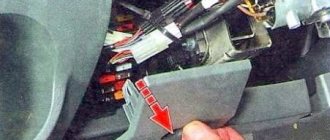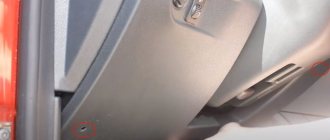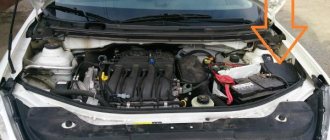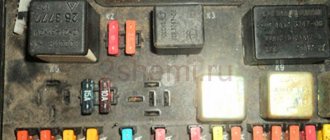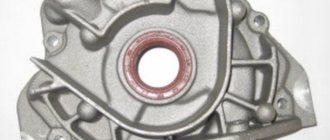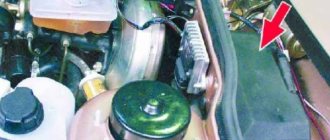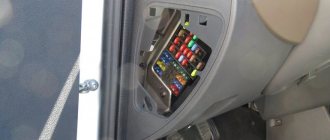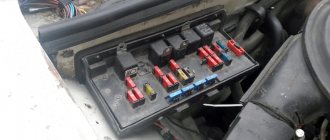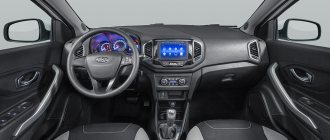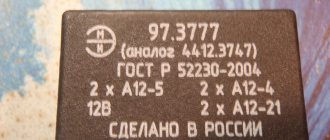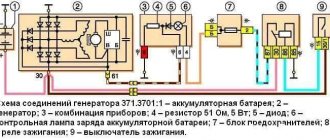The arrangement of fuses in a Lada family car is typical for Lada Kalina, Priora, Vesta, Grant.
In the engine compartment and in the cabin
Where are the fuses on the Lada Vesta:
- the main unit in the car interior, to the left of the steering wheel;
- additional module in the engine compartment, on the right behind the battery.
Total quantity: 12 relays - breakers, 50 fuses.
Schematic location of the Lada Vesta fuse box in the cabin
| Numbers/current | Functionality / where they are located |
| P(F-1) / 20 | Windshield washer |
| P(F-2) / 5 | Understeering's shifter |
| P(F-3) / 10 | High beam (left headlight) |
| P(F-4) / 10 | Steering column switch (left) |
| P(F-5) / 20 | Heated seats |
| P(F-6) / 30 | parking lights |
| P(F-7) / 30 | Rear dimensions |
| P(F-8) / 7.5 | Rear fog lights |
| P(F-9) / 10 | Right turn signal repeaters |
| P(F-10) / 10 | Automated gearbox selector |
| P(F-11) / 10 | Low beam (left side) |
| P(F-12) / 10 | Direction indicators |
| P(F-13) / 30 | Power circuit |
| P(F-14) / 30 | Stop signals |
| P(F-15) / 10 | Rain sensor, external lighting, hydraulic headlight range control |
| P(F-16) / 15 | Fuel pump, charging |
| P(F-17) / 15 | Illumination of the glove box, thresholds |
| P(F-18) / 10 | Turn signal repeaters (left) |
| P(F-19) / 10 | Low beam (right) |
| P(F-20) / 10 | Heated mirrors (external) |
| P(F-21) / 5 | Instrument panel (panel) |
| P(F-22) / 5 | central locking |
| P(F-23) / 5 | Canister, air flow sensor, timing valve |
| P(F-24) / 5 | ERA GLONASS |
| P(F-25) / 5 | Radio tape recorder |
| P(F-26) / 5 | Gasoline pump |
| P(F-27) / 20 | Parktronic |
| P(F-28) / 15 | Electric power steering |
| P(F-29) / 15 | Line output to tow hitch |
| P(F-30) / 20 | Reversing light |
| P(F-31) / 15 | Anti-theft alarm |
| P(F-32) / 15 | Illumination of the engine compartment, interior |
| P(F-33) / 5 | Window lifters |
| P(F-34) / 15 | Steering wheel rotation sensor |
| P(F-35) / 5 | Door program block |
| P(F-36) / 15 | Radio, diagnostic connector |
| P(F-37) / 15 | Generator |
| P(F-38) / 15 | Beep (optional) |
| P(F-39) / 15 | Daytime Running Lights |
| P(F-40) / 20 | High beam (right) |
| P(F-41) / 20 | Standard cigarette lighter |
| P(F-42) / 20 | Bus power |
| P(F-43) / 20 | Door locks, ABS, airbag |
| P(F-44) / 20 | Window lifters |
| P(F-45) / 20 | Heater fan (interior) |
| P(F-46) / 20 | Windshield wiper (windshield wipers) |
| P(F-47) / 15 | Air conditioner |
| P(F-48) / 15 | Windshield wiper (optional) |
| P(F-49) / 15 | Heated rear window |
| P(F-50) / 15 | Stability Program (ESP) |
Replacing the fuse
The process of replacing a faulty fuse module is simple. But be careful, insert modules with similar current ratings.
Exceeding or underestimating the amperage range is not permissible, because this can cause equipment to fail prematurely.
Sequence of actions when replacing in the cabin:
- Open the driver's door.
- Under the steering column we snap off the plastic casing; it is secured with six clips.
- Using tweezers, remove the module according to the serial number, which is indicated on the inside of the cover.
- We insert the new module and snap the cover.
How to get to the fuses in the engine compartment:
- Stop the engine and open the hood.
- A plastic case with relay breakers is mounted behind the battery.
- Carefully unclip the cover and replace the relay and power modules.
What fuses are used on Lada Vesta
Cars of the Lada Vesta family use knife-type power modules. The manufacturer abandoned the cylindrical configuration long ago due to the inefficiency of the latter.
Modifications of power modules:
The differences between each type are: shape, size, weight category, seating depth, installation location (interior, engine compartment).
Schematic location in the engine compartment
| Name | Block pinout |
| RP 1 | Lighting, seat heating |
| RP 2 | Responsible for the cigarette lighter |
| RP 3 | Heated rear window |
| RP 4 | Front windows |
| RP 5 | Interior heater (stove) |
| RP 6 | Window lifter for rear doors |
| RP 7 | Gasoline pump |
| RP 8 | Car socket (powered by 12 Volts) |
| RP 9 | Heated windshield |
| RP10 | Heating relay |
| RP11 | Starter |
| RP12 | Cruise control |
Wiring problems
If the above steps do not fix the problem, then the problem is in the car’s electrical wiring. To make sure of this, use a tester to “check” the contacts. There should be constant voltage at the red wire terminal, and at the blue terminal when the car's side lights are turned on. If there is no power, you should look for an open circuit in the car's common wiring circuit.
As you can see, a power outlet failure can be due to several reasons. In 90% of cases, the “culprit” is overloading the socket with a large number of connected devices or appliances with significant energy consumption. For example, powerful automobile compressors or current converters can easily blow a fuse. Therefore, try not to use power strips and powerful appliances, so that one day you do not encounter an outlet failure.
Share this article with your friends:
Review of Manufacturer Prices
| Name/article | Price in rubles |
| Housing cover Lada Vesta 8450007436 | From 300 |
| Jcase | From 180 / piece |
| Mini | From 140 / piece |
| EMM-T4 231A03142 (Renault) | From 170 / piece |
| PF895652A2 (Japan) | From 220 / piece |
*price indicated as of March 28, 2019.
Conclusion
Installing new power modules requires careful attention on the part of the technician. It is unacceptable to violate the current range. The exact data for each of the fuses is indicated in the operating instructions for the technical device. If difficulties arise, contact service station specialists for help.
Replacing the fuse
The process of replacing a faulty fuse module is simple. But be careful, insert modules with similar current ratings.
Exceeding or underestimating the amperage range is not permissible, because this can cause equipment to fail prematurely.
Sequence of actions when replacing in the cabin:
- Open the driver's door.
- Under the steering column we snap off the plastic casing; it is secured with six clips.
- Using tweezers, remove the module according to the serial number, which is indicated on the inside of the cover.
- We insert the new module and snap the cover.
How to get to the fuses in the engine compartment:
- Stop the engine and open the hood.
- A plastic case with relay breakers is mounted behind the battery.
- Carefully unclip the cover and replace the relay and power modules.
What fuses are used on Lada Vesta
Cars of the Lada Vesta family use knife-type power modules. The manufacturer abandoned the cylindrical configuration long ago due to the inefficiency of the latter.
Modifications of power modules:
The differences between each type are: shape, size, weight category, seating depth, installation location (interior, engine compartment).
Reviews
| № | Positive |
| 1. | Georgy Nikolaevich , 42 years old (drive2.ru): the car has been three years old since purchase, I haven’t made any investments, only scheduled maintenance. The fuses are all standard, nothing has been changed. |
| 2. | Mikhail , 48 years old (prom.ua): in two years I replaced two power modules once. I didn’t contact the service, I limited myself to my experience and skills. |
| 3. | Sasha , 38 years old (autotoday.com): There are no complaints about the standard power modules yet, the car is only a year old, but I heard that you can install a unit from Renault Duster, Logan of the second generation. |
| 4. | Kirill , 45 years old (rozetka.ua): mileage 75,000 km, only recently replaced five power modules with new ones. I believe that a resource of 75,000 km is more than enough for domestic transport. Of course, there is still a long way to go to reach foreign brands, but this is progress. |
| 5. | Petrovich , 44 years old, (avtoflit.com): I bought the car second-hand, good condition, five years old. I didn’t do anything to the power system, the units are operating normally. |
| 6. | Nikolaevich , 45 years old, (autotoday.com): I am satisfied with the quality of manufacturing and assembly of the Lada Vesta, no comments. I fix minor damage myself. |
| 7. | Vasilievich , 41 years old, (drive2.ru): the car is four years old, only recently replaced three relays - breakers in the engine compartment. Good build quality Lada. |
| Negative | |
| 8. | Nikiforovich , 49 years old (prom.ua): problems with the power system began after buying the car. I repeatedly contacted the service station due to burnt-out power modules. The problem is still not resolved. |
| 9. | Nikolai Semenovich , 46 years old, (avtoflit.com): I do not recommend standard fuse blocks for the Lada Vesta. If possible, replace with new ones from Renault Duster, Logan of the second generation. |
| 10. | Vyacheslav Petrovich , 47 years old, (drive2.ru): the car is new, but the weak points are inherited from previous generations. |
| 11. | Stanislav Vasilyevich , 39 years old, (autotoday.com): after two years of operation, the car began to crumble in the literal sense of the word. The build quality is still raw and needs improvement. |
Cigarette lighter fuse
One of the most frequently blown fuses is the cigarette lighter fuse. The reason for its frequent burnout is simple: consumers are used with a higher current consumption than the fuse allows: either several energy consumers are connected at once through a “tee” or a sufficiently powerful compressor is used to inflate the wheels. It is also possible that the circuit will close when a third-party consumer socket is inserted into the cigarette lighter socket: a phone charger, a radar detector.
Where is the cigarette lighter fuse located?
The cigarette lighter fuse is located in the mounting block under the panel on the left side of the steering wheel. To open the panel to access the fuses, pull out the black stud caps of the plug using your fingernails or sharp objects, disconnect the clips, and pull the bottom of the plug. The cigarette lighter fuse is numbered F41 and has a rating of 20A. Fuse type: JCase The cigarette lighter also has a separate K8 relay.
Checking and replacing the VAZ 2107 relay
Let's look at the replacement process using the rear window heating system relay as an example. This element is located in the mounting block. You can find out the exact installation location by looking at the diagram printed on the back of the protective cover:
- Turn off the ignition and open the fuse box.
- Find the relay that needs to be tested and replaced.
- Remove it using pliers located in the unit body.
- Install another device that is known to work instead of the removed device. You can use a relay from the headlight or headlight cleaning system.
- If diagnostics show that the removed relay has failed, install a new one in its place.
The inspection and replacement process is the same for all devices. The only difference is their location:
- the main relays are installed in a fuse box;
- the device that ensures the operation of the ignition, as well as light alarms and turn signals, is located in the vehicle interior, on the front panel behind the instrument cluster;
- the starter activation relay is installed in the engine compartment, on the right mudguard;
- The windshield cleaning device is located under the instrument cluster on the driver's seat side; it is fixed to the car body with two bolts.
